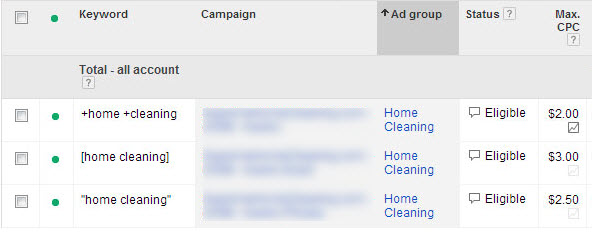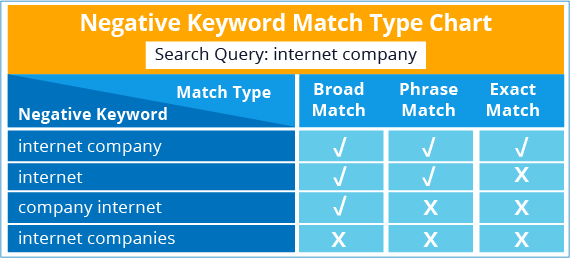[display-name-category]
[post_author]
Broad, broad match modifier, phrase, and exact. You would think it’s that simple, right? Not so fast. When it comes to matching types
everyone seems to have preconceived notions of how these should be set up and managed.
In fact, the use of match types is a subject that can remain up for debate even among advanced practitioners.
The truth is, every match type has its advantages as well as drawbacks, and this is not a one size fits all type of deal. So what on earth are you to do?
The key is to use these together or separately, depending on your overall strategy or industry. No strategy is better or worse, they are just different. Different is good.
Rather than bossing you around and telling you what match types to use, I will give you some strategies you can use that can enhance your AdWords campaigns and allow you to achieve great results. Guaranteed.
What Your Mother Never Told You About Match Types
Different match types within the same account compete against each other. It’s incredible how both beginners and professionals alike fail to take into consideration the continuous A/B split testing that is performed in different components of an account, including our good old friend match type.
However, people say the first step to solving the problem is to acknowledge it exists, so let’s start by identifying we have to understand Google’s algorithm to be able to use it to our advantage.
In a nutshell, if you add different match types to a single account, they will compete against each other for attention. They will compete for impressions, clicks, and conversions.
Here’s the punchline: Keep this in mind when taking these strategies into consideration and implementing several of them. Each match type is beneficial in its own way, and you can use each in different instances.
1) Use Broad Match Modifier and Then Ditch It for Exact Match
Yes, I know a broad match sometimes is depicted as an anti-hero. However, when determining what match types will work for you, show me the data. Nothing delivers the data as broad does. The good news? Broad Match Modifier is here to save the day, with more restrictions and less irrelevant traffic. With Broad Match Modifier, every keyword with the + sign has to be included in the query, but the order does not matter.
Keep in mind that you have to make sure to make time to babysit this bad boy because it must be used carefully. If you’re not careful, you might lose a lot of money paying for irrelevant traffic. Nobody wants that, so make sure to add a LOT of negative keywords on the way or monitor traffic to counteract its poisonous cons. Take a look at the following search results when typing piano benches.

Next, analyze trends in the search terms report from these keywords and add them as keywords in phrase or exact. Broad Match Modifier will give you enough data to be able to determine what variations of keywords get you the type of traffic you want. I promise the grass is greener on the other side!
2) Separate Match Types into Different Ad Groups
First, this will ensure maximum control across campaigns. Who would argue against increased efficiency in the ongoing management of an account? If you wish to pause an exact match keyword because you have been monitoring it, and its performance has been bothering you for a while, do it and move on.
But wait, there’s more. This strategy also allows you to have a clear bidding strategy across match types. When I optimize campaigns, I usually filter by cost, clicks, conversions, CPA, whatever keyword, search query, ad group, you name it.
When we have clustered match types without a specific bid strategy and filter keywords based on cost/traffic, we are making decisions based on the bid strategy on the ad group in which it resides, not the keyword in particular. By implementing this strategy, match type based strategies will be a piece of cake.
For this to work, adding ad group level negative keywords is intrinsically important. This, as mentioned, will allow you to kill a match type off without looking back.
Pro Tip: Use this strategy especially when you know that user intent varies across match types in your account. This will give you room to show a different message based on specific intent.
3) Include All Three Match Types in Your Campaign
To counteract this strategy, some people claim if you know the fundamentals of each match type, where to use it, and why, you don’t need to add all three. However, having all three match types in your campaign will allow you to test which one is cheaper, has lower CPCs, higher conversion rates, and all that lovely data. You will find out what match types work for you and which ones don’t.

The negative aspect of this approach is that a broad match modifier, phrase, and an exact match can vary when it comes to the audience and its intent, so the ad copy will have to be created carefully.
4) Match Type Based Bids: The Organized Mess
You already found out that a broad match modifier catches a wider net when it comes to search terms. On the other hand, the exact match increases your relevancy and has lower costs. How do you make sure Exact Match is the preferred match type when these two compete against each other for impressions? You implement a tiered bidding strategy.
If you use more than one match type, the best way to control ad serving is to differentiate the bidding on match types:
-
Highest bid = Exact Match is the highest bid
-
90% of the highest bid = Phrase Match
-
75% of the highest bid = Modified Broad Match
In this example, we would bid more for the more restrictive match type, exact. In fact, for the sake of being specific, bid higher in the most restrictive match types by around 10 to 15%. This will end up being a beautiful, organized mess. When your broad match modifier and exact match compete against each other, Exact Match will be our champion. That being said if you’re going to have your keywords compete against each other, do it well.
This is just one example of how you can implement this strategy. On your own, you want to determine what match types bring the traffic that is most valuable to you and your business and increase bids on these so that they end up winning when they get to compete against less preferred match types.
5) Good Guy Exact Match
Don’t deny it, there will always be keywords you will never get over and for which you will always want to show for, and it’s ok. On the plus side, people who click on your ad after typing that exact keyword will have more likelihood to have more interest in your product or services and will result in higher conversions. The advantage here is, what you see is what you get.
6) Brand Terms + Phrase Match = Match Made in Heaven
Typically, the phrase match will have great results with branded variations. Branded search queries usually go like this: Brand Name + Service/Product Offering. In this example, someone looking to get ripped will look for Best Gym Ever (brand name) + Zumba classes, instead of just the brand’s name. And here I, the owner of Best Gym Ever, was thinking that my Insanity sessions were the most popular. I would have never found out about the Zumba success if I had not used a phrase match.
What I’m trying to say is, that phrase match is here to help you. Use it to your advantage for your branded variations. This is a perfect way to find out what variations people search for when they look for your brand name. You might be surprised.
7) Don’t Forget About Negative Keyword Match Types
If you see a few troublesome search queries in your reports, then a creative use of negative keywords may be in order.
Negative keywords prevent ads from showing whenever a search query contains a keyword listed in your negatives. You can also set negative keyword match types for more precise targeting – negative match types.
But, be careful of how you add them. Many times in accounts, if there is a sudden downturn in impressions, it can be attributed to a negative keyword accidentally blocking relevant traffic.

Exact Match Negative Keywords
Use negative keywords in the exact match when you want to filter a term that by itself drives irrelevant searches, but combined with other words could get you quality leads.
Phrase Match Negative Keywords
Use phrase match negative keywords ideally when going through your search terms to filter out specific keyword sequences.
Broad Match Negative Keywords
Broad match negative keywords should be used for negative queries you would not want triggering any of your ads. Using only a broad match for all of your negative keywords is a big no-no, but there are exceptions.
Now It’s Your Turn
So what do I do now? I’m glad you asked. Now it’s your turn. Depending on what your goals are, use a strategy that allows you to find out what match types will be your heroes. PPC campaigns live and die by the data that they collect. Make sure you make most of this and find the keyword concepts that will save the day and make your campaigns successful.






